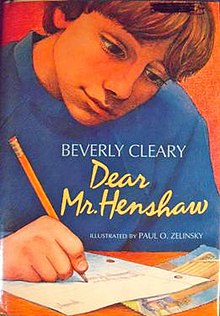Dear Mr. Henshaw

First edition
|
|
| Author | Beverly Cleary |
|---|---|
| Illustrator | Paul O. Zelinsky |
| Country | United States |
| Language | English |
| Genre | Young adult |
| Publisher | William Morrow |
|
Publication date
|
August 1983 |
| Media type | Print (Hardback & Paperback) |
| Pages | 144 pp |
| ISBN | |
| OCLC | 9371228 |
| LC Class | PZ7.C5792 De 1983 |
| Followed by | Strider |
Dear Mr. Henshaw is a juvenile epistolary novel by Beverly Cleary that was awarded the Newbery Medal in 1984. Based on a 2007 online poll, the National Education Association named the book one of its "Teachers' Top 100 Books for Children."
Dear Mr. Henshaw begins with the book's main character, Leigh Botts, writing a letter to his favorite author, Boyd Henshaw. He continues to write him letters occasionally until the 6th grade, when he is expected to write a letter to his favorite author. Naturally, he chooses to write to Mr. Henshaw, and asks him a series of questions. Mr. Henshaw writes back with clever and playfully antagonistic responses and some questions for Leigh to answer. Initially Leigh is reluctant to reply to Mr. Henshaw, but Leigh's mother finds out and demands he show Mr. Henshaw the courtesy of a reply, too.
Through his answers to Mr. Henshaw, Leigh's personal concerns and conflicts are revealed, such as his struggles with his parents' divorce, his complex relationship with his father, being the new kid in school, and a mysterious lunch thief. Later, Mr. Henshaw encourages Leigh to keep a diary of his thoughts and feelings, and the book then switches from a letter format to a diary, in which he initially writes to Mr. Pretend Henshaw. Leigh decides to write for the Young Writers club and receives an honorable mention in the school yearbook. Later, one of the contestants turns out to have cheated; Leigh is, therefore, allowed to have lunch with a famous author. Even though it is not Mr. Henshaw, Leigh still enjoys it and the author personally compliments Leigh's story about him and his dad hauling grapes in his rig.
By writing to Mr. Henshaw, Leigh must learn to accept that there are parts of his life he cannot change. For example, his parents will never remarry, people will continue to steal his lunch even though he has made an alarm for his lunch box, and he can never fully rely on his father to be available when he is needed. He must deal with problems that many other children also have to cope with, such as feeling lonely because he is new in town, school assignments, etc.
...
Wikipedia
